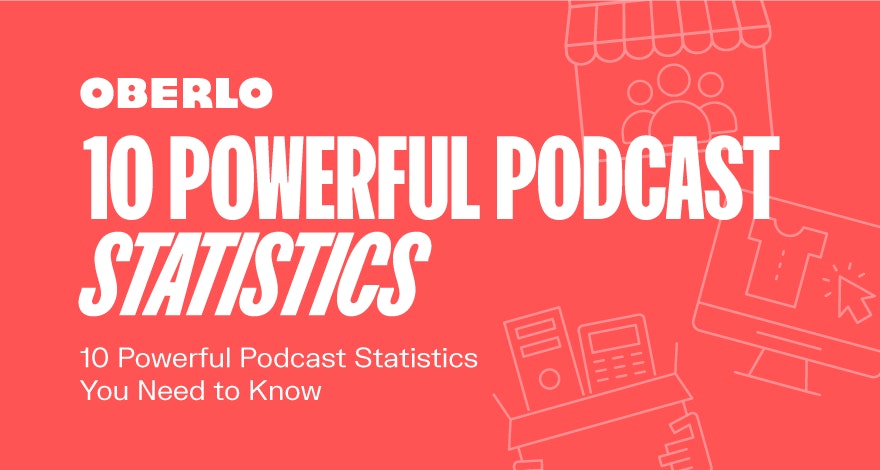It’s all the marketing rage these days and you’re hearing about it day-in, day-out. Not only is it one of the hottest marketing tools, but given its popularity, you may also even have been a target of these strategies yourself.
Yep, you guess right! We’re talking about podcasts. As a dropshipping entrepreneur, starting your own podcast to grow your business isn’t something you should overlook as it can bring many clear benefits and advantages to your business.
In this article, we’ll share with you ten powerful podcast statistics you need to know in 2024 that will come in handy when creating a podcast strategy for your dropshipping business.
Post Contents
- What is a Podcast?
- 1. How Many Podcasts Are There?
- 2. Podcast Listener Statistics in the US
- 3. Most Popular Device Used to Listen to Podcasts
- 4. Why People Listen to Podcasts
- 5. Podcast Statistics: Frequency
- 6. Where Podcasts Are Consumed
- 7. Podcasts Spur Purchases
- 8. US Podcast Ad Revenues
- 9. Podcast Statistics: Time Spent
- 10. Average Number of Podcasts Consumed
- Conclusion
- Summary: Podcast Statistics
- Want to Learn More?



What is a Podcast?
Before diving into podcast statistics, you first need to understand just what podcasts are.
In a nutshell, a podcast is a kind of online audio broadcast. People might listen to a podcast once-off when winding down at home after a hectic day or simply relaxing. Or, as the following podcast statistics will show, it is also popularly consumed while multitasking such as commuting to or from work, doing chores, working out, and so on.
→ Click Here to Launch Your Online Business with Shopify
Unlike a video or a blog post, a podcast does away with the visual element. In that way, it’s much easier to consume. If you want to jump straight to learning about how to start a podcast, check out this step-by-step guide!
Now that we’ve gotten the basics out of the way, let’s dive straight into the ten most powerful podcast statistics all entrepreneurs must know in 2024!
1. How Many Podcasts Are There?
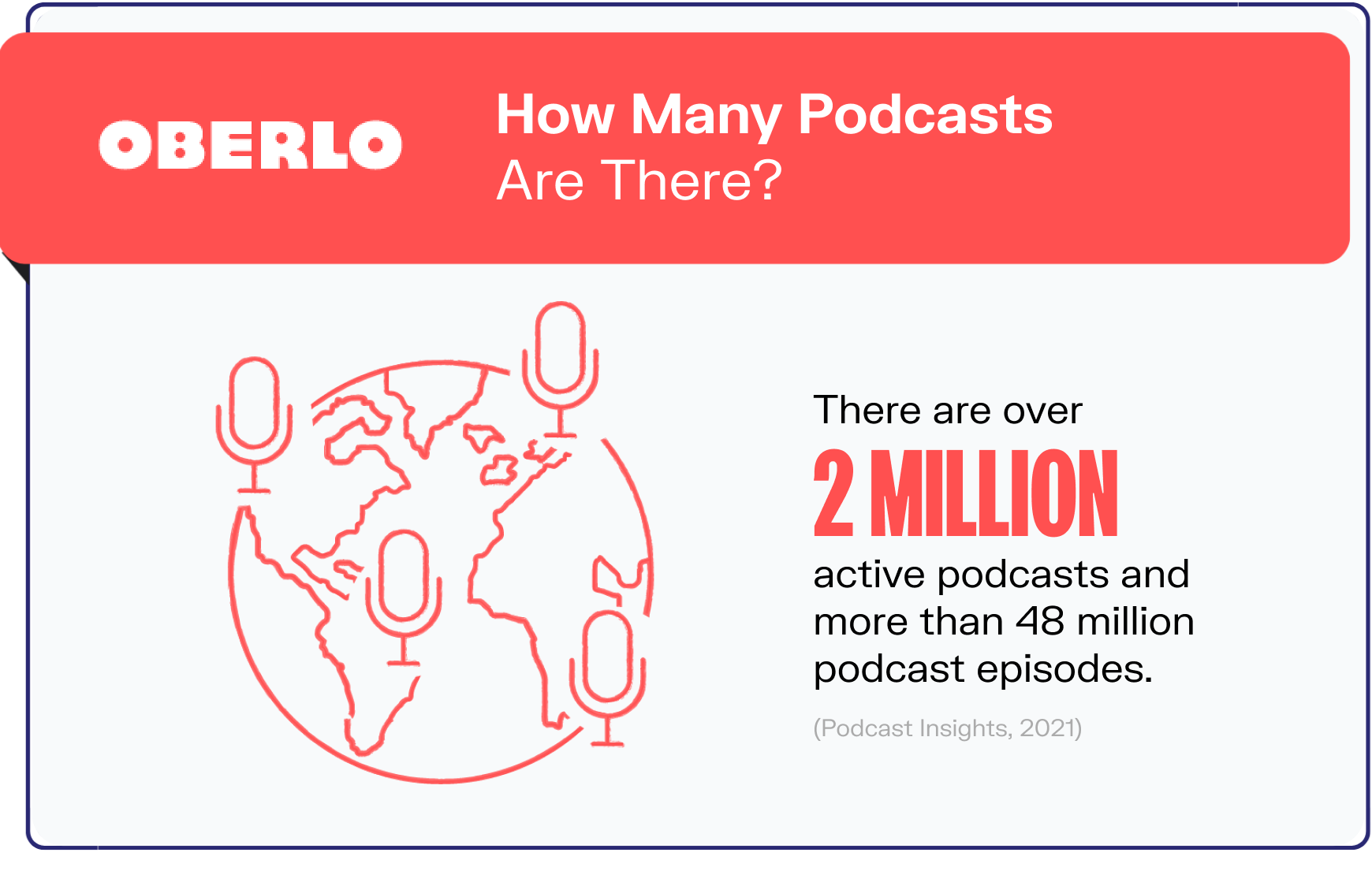
Perhaps one of the most common and basic questions about podcasts is, “How many podcasts are there?”
So here’s the first of ten podcast statistics. As of 2021, there are over two million podcasts and more than 48 million podcast episodes (Podcast Insights, 2021). This is pretty startling growth, considering there were just over 500,000 active podcasts from just three years ago in 2018.
These podcast statistics are completely in line with the fact that podcasts are slowly going mainstream. In fact, it’s estimated that 83 percent of the US population is now aware of what a podcast is – up from 64 percent in 2018.
2. Podcast Listener Statistics in the US
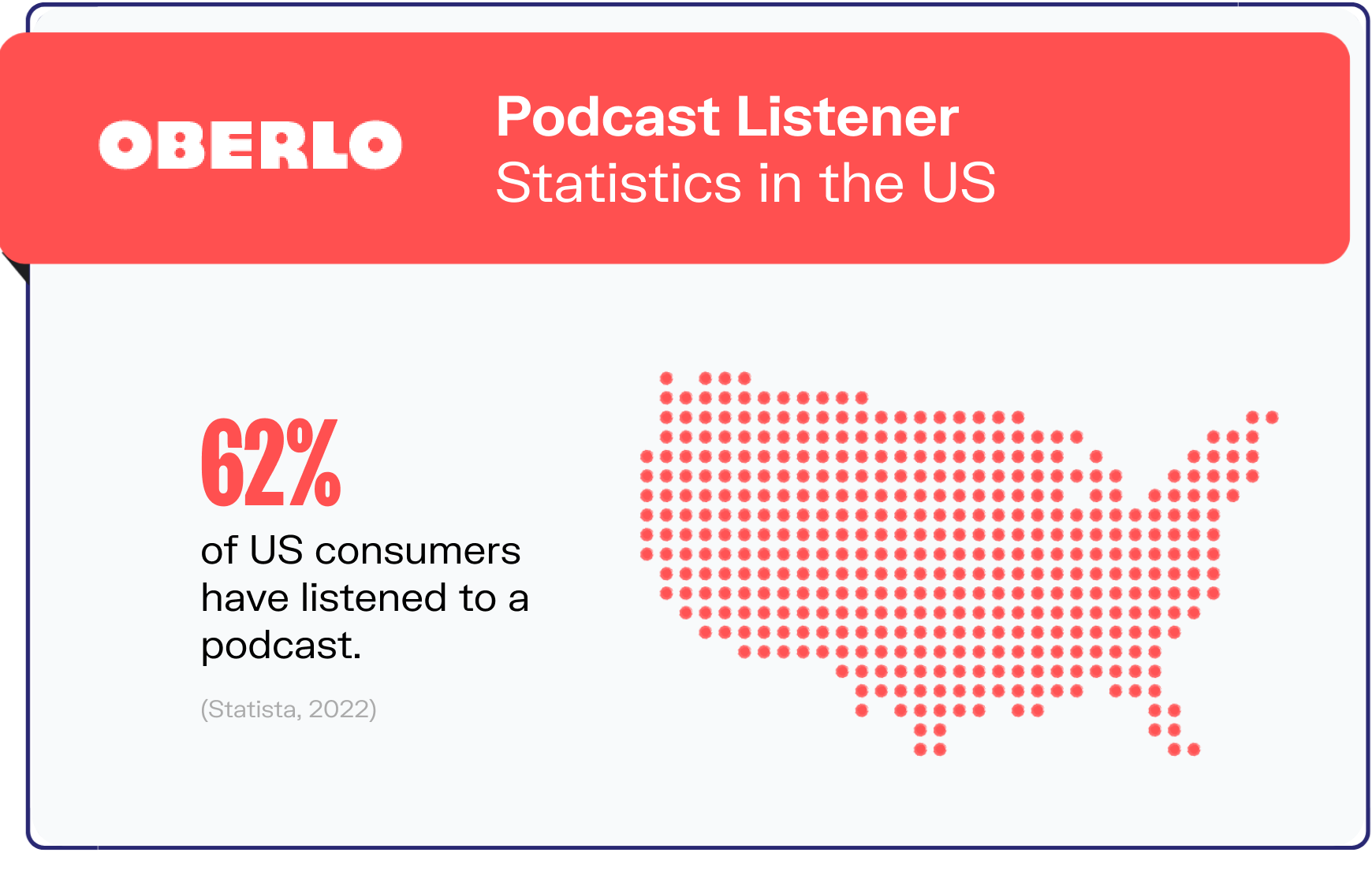
The increase in the number of podcasts has been driven by the growing demand for them.
Aside from a slight dip in 2013, the number of podcast listeners in the US has pretty much been on the rise over the past 15 years.
The most recent survey conducted in 2022 found more than six in ten (62 percent, to be exact) consumers above the age of 12 in the US have listened to at least one podcast (Statista, 2022).
This marks a five percentage point increase from 2021, the biggest growth in three years. It also marks a tremendous increase from the 23 percent of consumers in 2010 who had ever listened to a podcast.
Aside from the increase in listeners, these podcast listener statistics also show that a growing number of the US public is tuning in to podcasts regularly. In 2021, 58 percent of the US population listened to podcasts at least once a month, while 29 percent did so weekly.
3. Most Popular Device Used to Listen to Podcasts
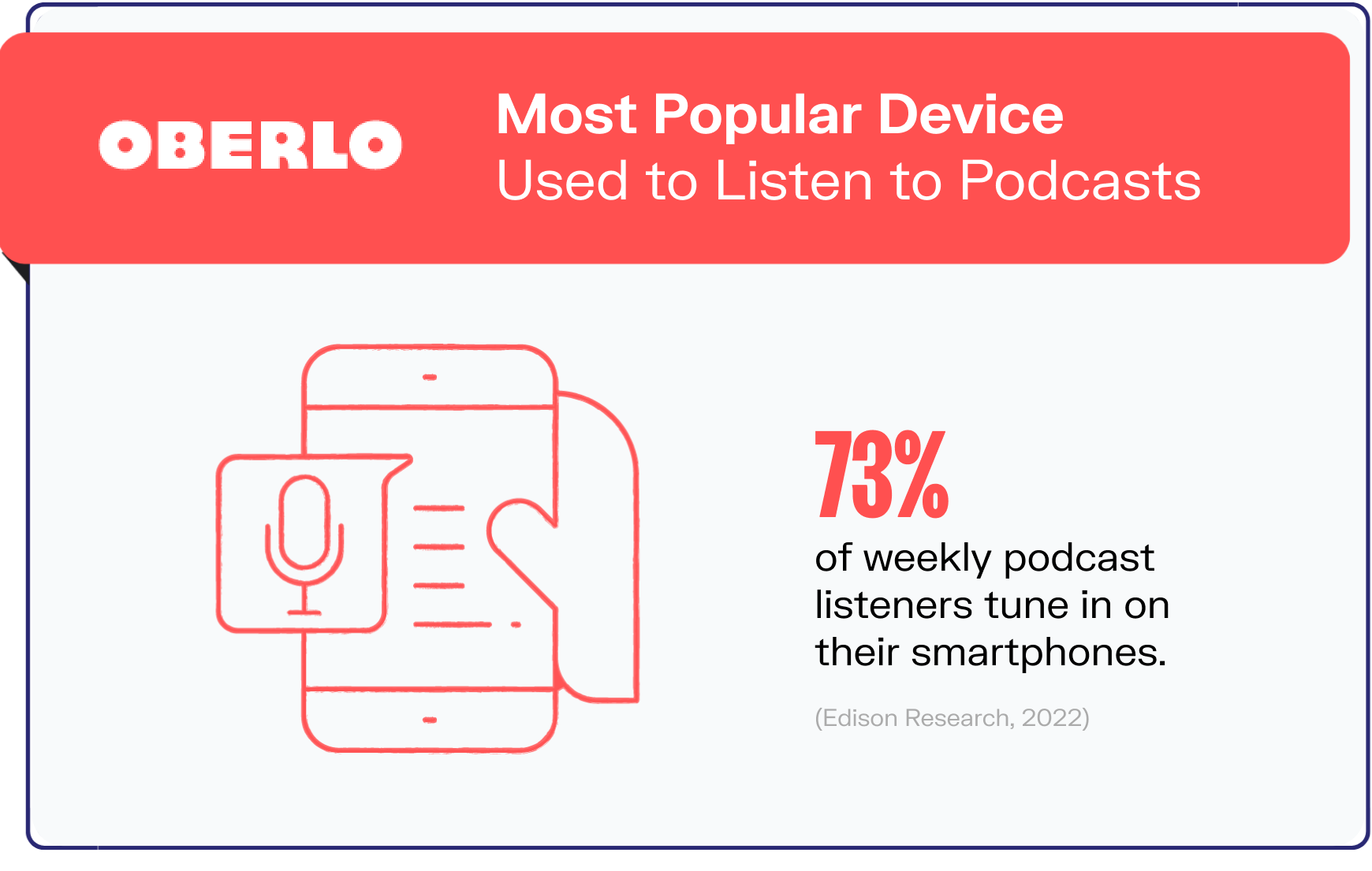
While some people tune in to podcasts on web browsers on their computers, most actually listen to podcasts through mobile apps. This is probably why portable devices are by far the most popular types of devices podcast listeners select when tuning in.
As many as 73 percent of listeners in the US use their smartphones to listen to podcasts (Edison Research, 2022). Computers and laptops, on the other hand, are the go-to choice for just 13 percent of podcast listeners – which is likely to be the group that listens to podcasts on their web browsers.
With these podcast statistics in mind, you may think you’re ready to launch your podcast strategy. Before you do so, consider your channel. Podcast statistics show that mobile app podcast listeners are more likely to make their way through an entire podcast episode than those tuning in through a web browser.
4. Why People Listen to Podcasts
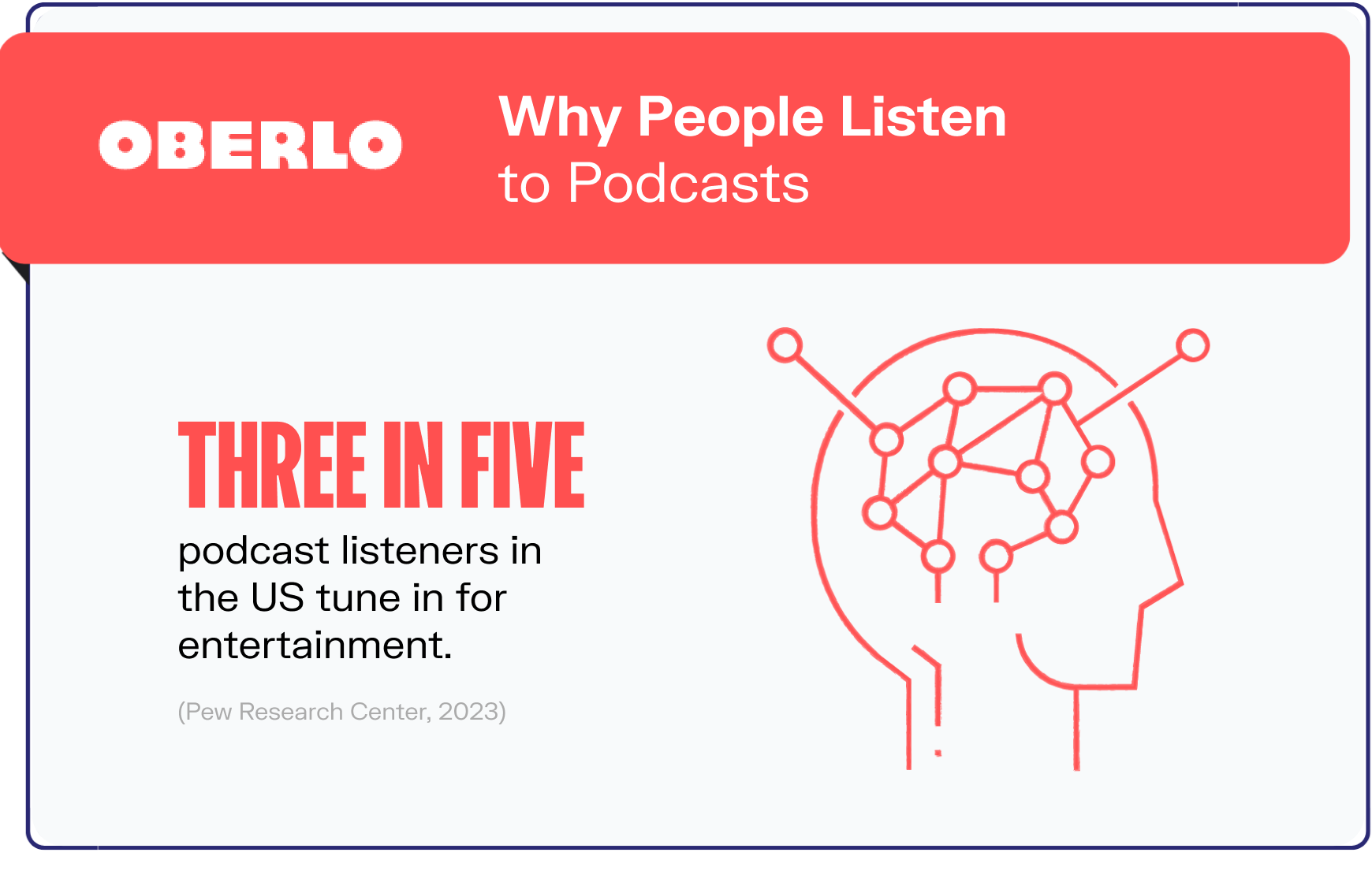
From a consumer’s point of view, there’s just so much that podcasts can offer. From acquiring new knowledge to feeling inspired, there are plenty of reasons podcast listeners tune in.
On the top of that list is entertainment. Three out of every five podcast consumers in the US say they enjoy tuning in to podcasts to stay entertained (Pew Research Center, 2023). That aside, podcasts are also a way for them to learn new things—55 percent of people list it as a reason they listen to podcasts.
Another reason people tune in to podcasts is to be able to multitask. Let’s face it, the ability to consume information while having your hands free to carry out other chores is an incredible lure. It is why more than half (52 percent) of Americans listen to podcasts.
Many others tune in to learn about new perspectives or stay informed about the latest news and events—30 percent and 29 percent of podcast listeners list these as motivations to listen to podcasts, respectively.
5. Podcast Statistics: Frequency
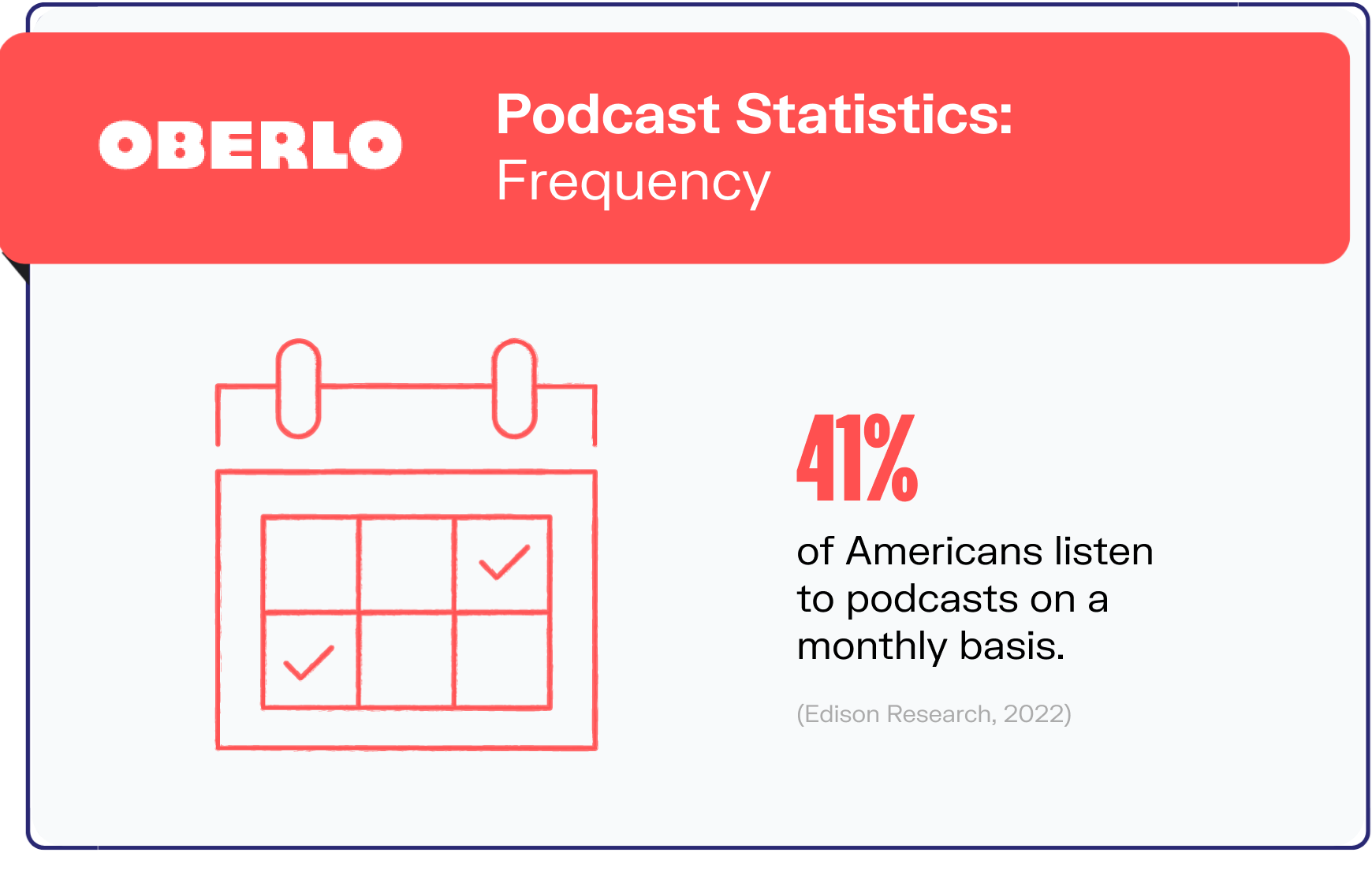
Here’s another one of many podcast statistics to prove its rising popularity: 41 percent (32 percent) of Americans listen to podcasts at least once a month (Edison Research, 2022).
To put things into perspective, this is not only a four percentage point increase from 37 percent the previous year but also nearly double the share of people listening to podcasts in 2016.
It’s also interesting to note that of all podcast listeners who tune in once a month, more than half (53 percent) are men. 46 percent are women, and the remaining one percent identify as non-binary or other.
Age also plays a role in how often Americans listen to podcasts. Half of those aged from 12 to 34 say they do so once a month, compared to 43 percent for listeners aged 35 to 54. In contrast, just 22 percent of consumers aged 55 and above tune in every month.
6. Where Podcasts Are Consumed
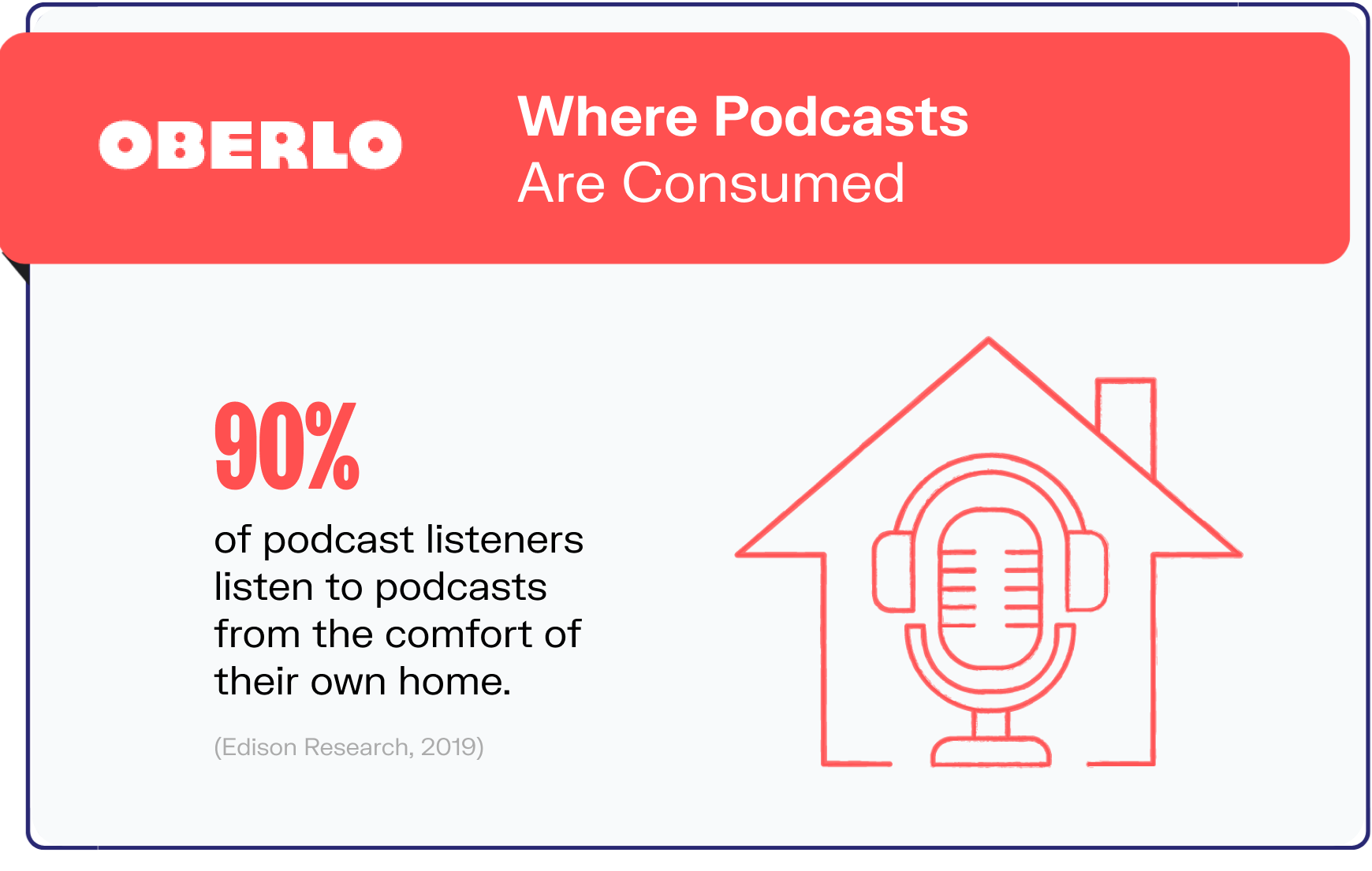
When it comes to the environment, it seems there’s nothing like the comfort of your own home to tune into a podcast. In fact, nine out of every ten podcast listeners in the US say they listen to podcasts at home (Edison Research, 2019).
Podcasts are also being consumed while on the move, with 64 percent, 49 percent, and 37 percent of listeners also choosing to tune in while in a car or truck, walking around, and commuting, respectively.
And podcasts appeal as much to those who enjoy simply soaking in all that podcasts have to offer as those who enjoy multitasking. Seven out of ten podcast listeners say they don’t do anything else when listening to podcasts. Others prefer to multitask, with 59 percent listening to podcasts while doing housework, 52 percent driving, and 50 percent cooking or baking.
7. Podcasts Spur Purchases
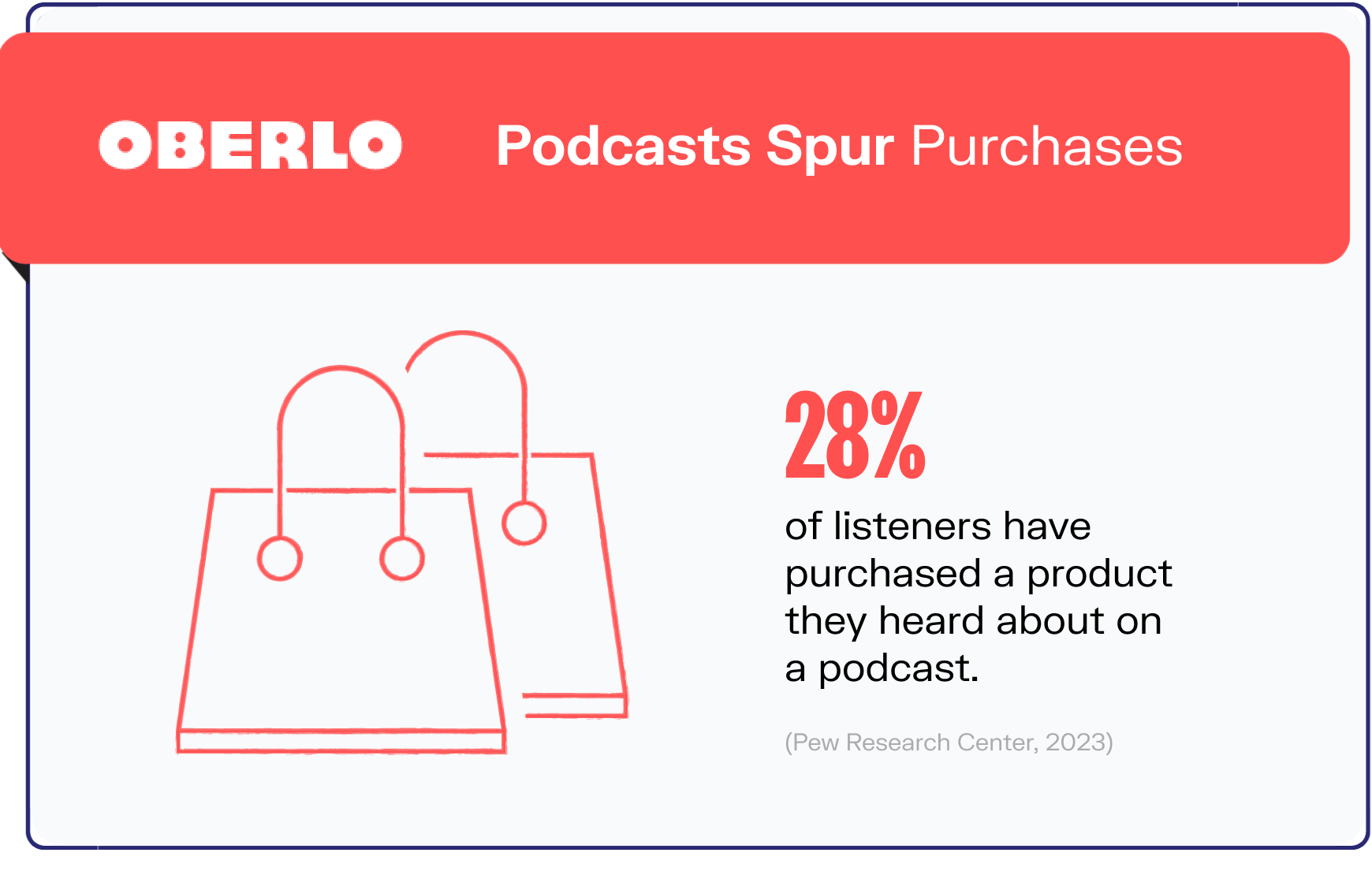
Business owners, pay extra attention to this next podcast statistic: 28 percent of podcast listeners have purchased a product they heard about on a podcast (Pew Research Center, 2023).
Though such podcast statistics may spur you to start your own podcast, simply launching a podcast to promote your products isn’t enough. As with all marketing efforts, increasing your brand awareness is equally as important.
You may be interested to know that the most popular podcast topics for listeners are comedy and entertainment (such as pop culture and arts). 47 percent of listeners say they frequently tune in to podcasts about comedy, and 46 percent do so for discussions on entertainment. These are followed by politics and government (41 percent) and science and technology and history (40 percent each).
If these podcast statistics still aren’t convincing enough, how’s this: more than half of podcast listeners have followed the social media accounts of a podcast or its host(s).
8. US Podcast Ad Revenues
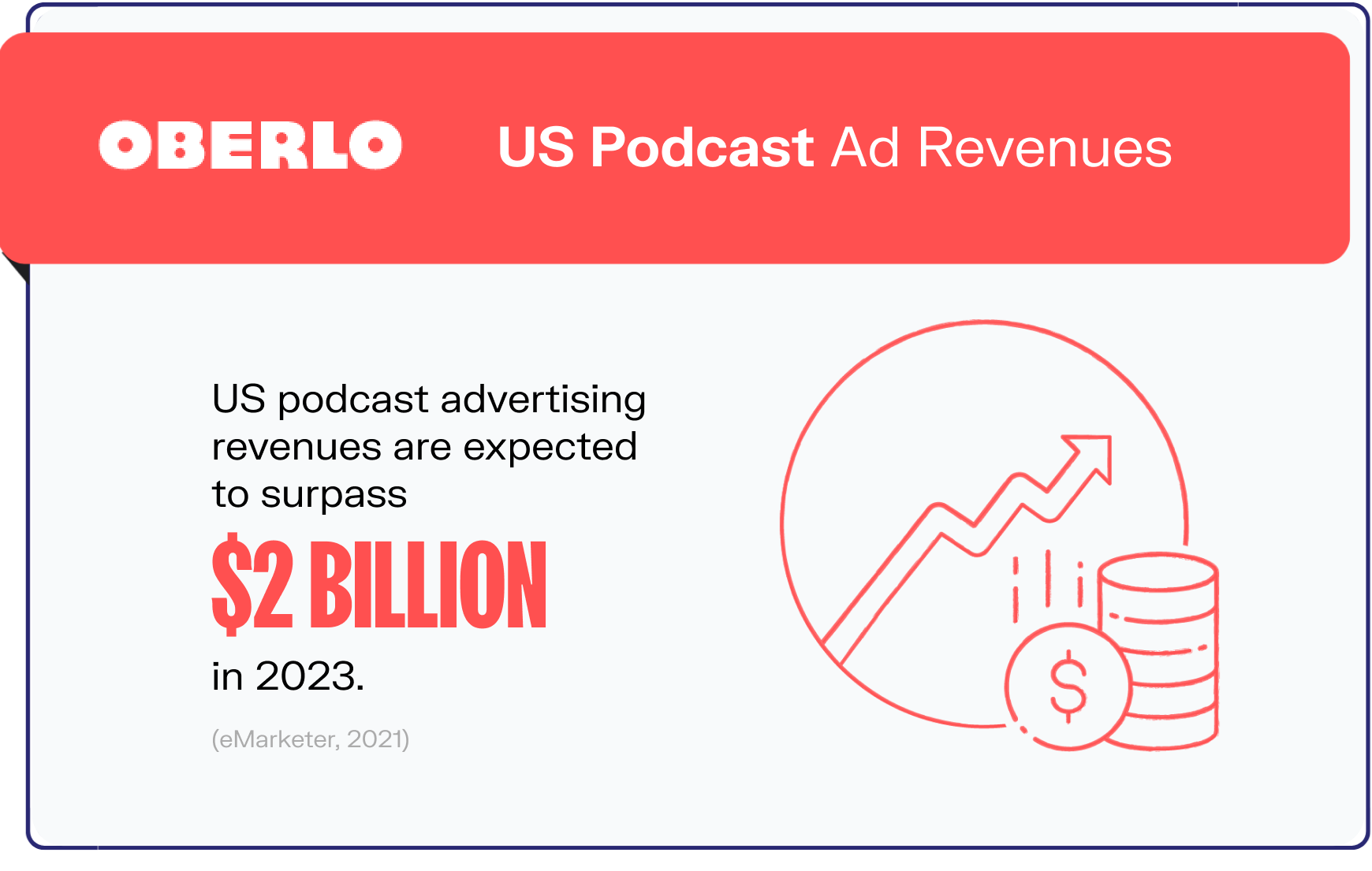
Here’s another statistic to highlight the growing podcast market. In 2021, marketers in the US spent a whopping $1.33 billion on podcast ads (eMarketer, 2021).
If that isn’t enough to convince you of the growing reach and potential of podcasts, maybe this next podcast statistic will – podcast ad revenues in the US are expected to continue rising and surpass $2 billion annually by 2023.
In 2025, marketers are forecast to spend $2.74 billion, which is more than double experts’ projections for 2021.
Given the potential of podcasts and their rising growth, it comes as no surprise, then, that even music streaming service Spotify is jumping in and has spent nearly $900 million in podcast-related acquisitions.
9. Podcast Statistics: Time Spent
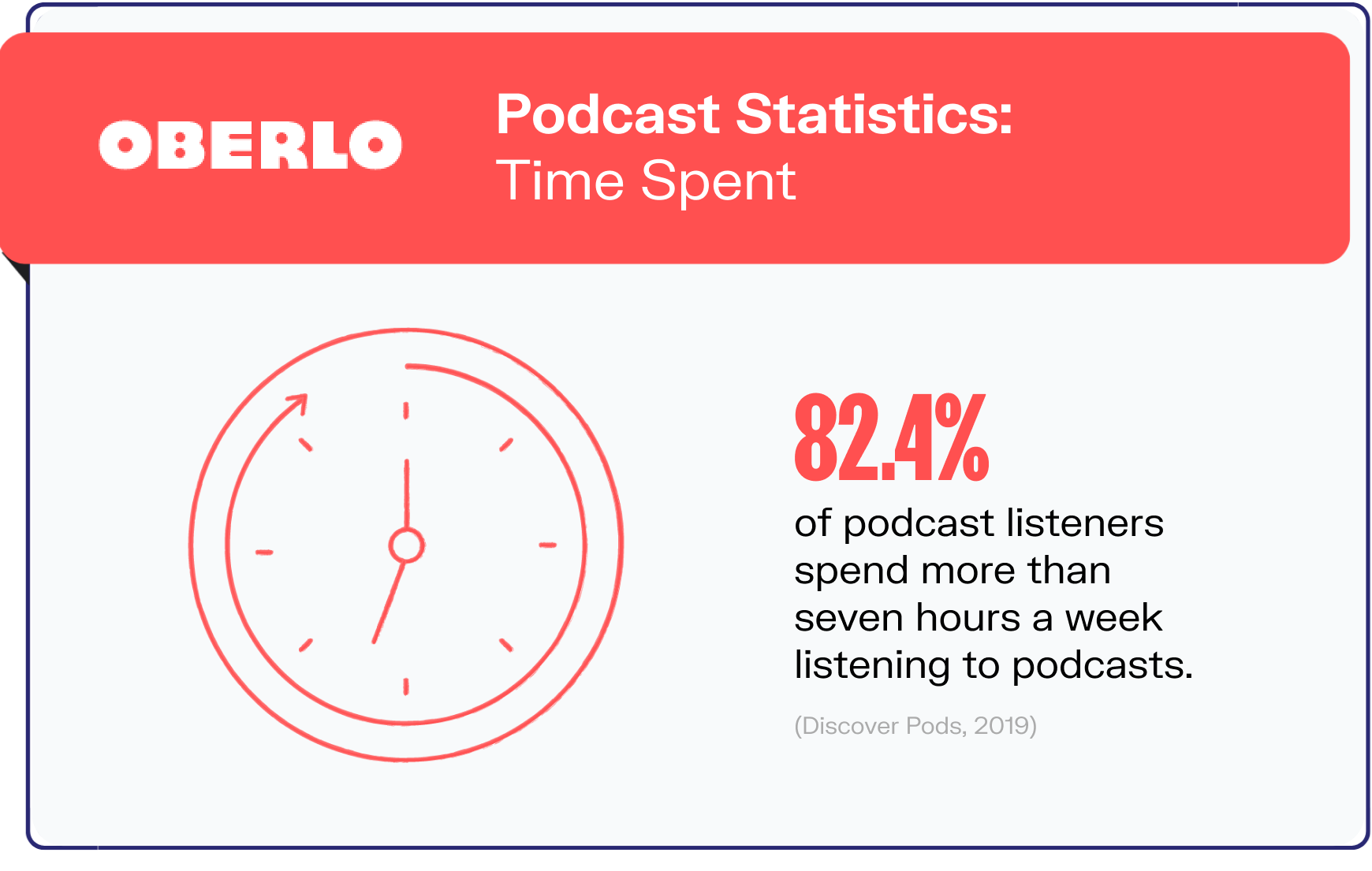
According to a recent survey, more than eight out of every ten podcast listeners spend more than seven hours per week tuning into podcasts (Discover Pods, 2019). That’s an average of over an hour a day for most listeners, which, for some respondents, is more than the time they spend on social media or watching television!
For around a quarter of podcast listeners, their dedication to podcasts is nearly like a part-time job – 22.4 percent of listeners spend more than 22 hours a week (or more than three hours a day) listening to podcasts.
The time spent listening to podcasts is also on the rise. About 30 percent of the US online population who has ever tuned into a podcast say they are listening to podcasts more now than they were a year ago.
10. Average Number of Podcasts Consumed
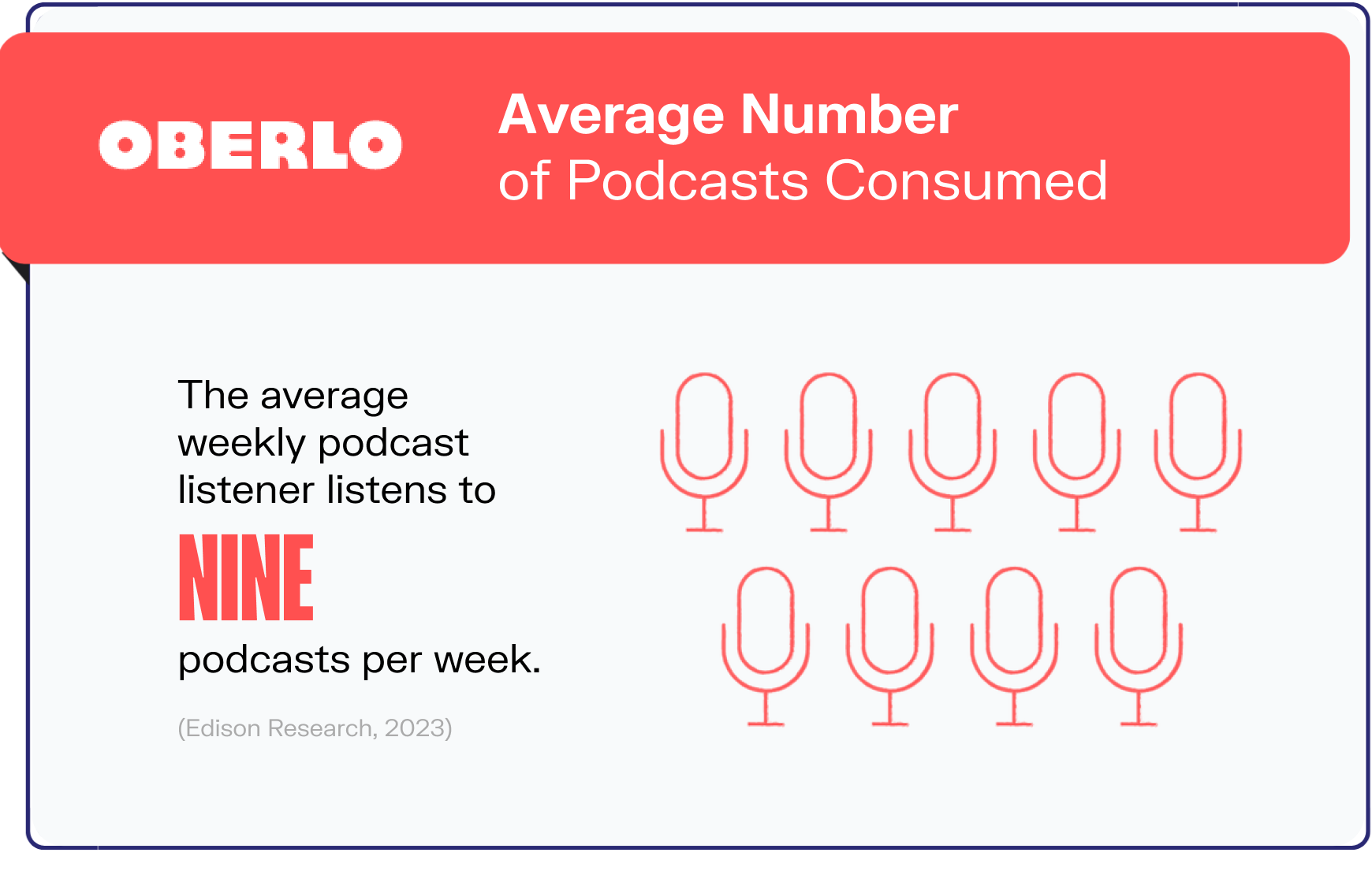
Most podcast listeners in the US certainly don’t have a monogamous relationship with the audio shows they tune in to. That’s totally understandable too, given how much one can learn from podcasts.
The average weekly podcast listener in the US branches out quite a bit, listening to nine shows in an average week (Edison Research, 2023). More than half (58 percent) listen to at least four different shows a week, and 11 percent tune into just one podcast per week.
That said, one of the main challenges listeners face today is discovering new podcasts. So to really get serious with podcasting for your business, you may want to consider going the extra mile by posting new episodes frequently and joining a podcasting community to build up your brand and ensure your podcast gets noticed.
This can be particularly effective now as podcast familiarity in the US rises and the data points to podcasting making a comeback following a fall in listener numbers in 2022. In 2023, 83 percent of the population says they are familiar with podcasting, a 19 percentage point increase from 64 percent in 2018.
Conclusion
There you go! With these podcast statistics, you’re now fully armed with the most important podcast statistics you’ll need to know to launch your own podcast in 2024.
Your next step would be to check out our post on how to start a podcast for more podcast listener statistics plus a comprehensive step-by-step guide on setting up a podcast.
And if you ever need a little push, check back on this post on podcast statistics for inspiration!

Summary: Podcast Statistics
Here’s a summary of the podcast statistics for 2024:
- There are currently over two million podcasts and more than 48 million podcast episodes.
- 62 percent of US consumers have listened to a podcast.
- 73 percent of weekly podcast listeners tune in using their smartphones.
- Three in five podcast listeners in the US tune in for entertainment.
- 41 percent of Americans listen to podcasts on a monthly basis.
- 90 percent of podcast listeners listen to podcasts from the comfort of their own homes.
- 28 percent of listeners have purchased a product they heard about on a podcast.
- US podcast advertising revenues are expected to surpass $2 billion in 2023.
- 82.4 percent of podcast listeners spend more than seven hours a week listening to podcasts.
- The average weekly podcast listener in the US listens to nine podcasts per week.



Want to Learn More?
- How to Start an Online Store (With No Experience)
- 13 Best Free Online Courses to Learn New Skills
- 10 Best Squarespace Alternatives to Consider
- Best Web Hosting For Your Small Business
Is there anything else you’d like to know about podcast statistics and wish was included in this article? Let us know in the comments below!
